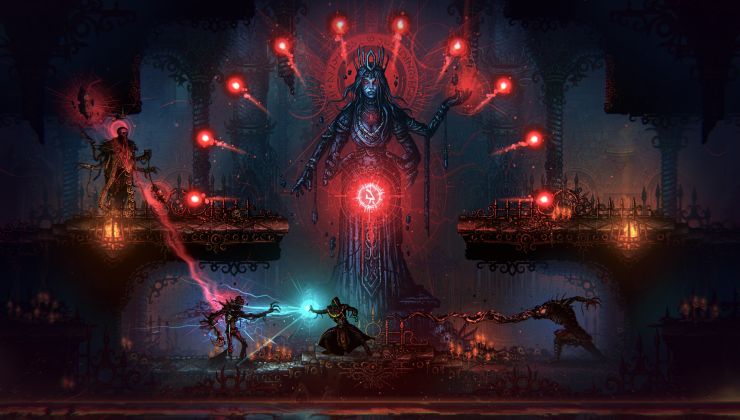Pandora: First Contact - Gold Edition, the science fiction 4X turn-based strategy game from Proxy Studios can now be found for Linux gamers on GOG.
Disclosure: GOG provided me with a key.
It's been a long time since I played Pandora: First Contact, but I do remember it fondly for being a rather good 4X game in the spirit of Alpha Centauri, while also still very much being its own game.

Direct Link
The Gold Edition that GOG has is essentially the main game, along with the Eclipse of Nashira DLC. The DLC makes the game a fair bit more interesting, with all the newer covert warfare mechanics.
It's not the newest of games, but if you're a fan of strategy games and you've not looked at it before it's a worthy choice to put a lot of time into. As you can imagine, a game of this kind has a pretty big feature list and it will take you time to learn it all, it's interesting though and looks pretty good graphically too.
I still love the intro to this game, with spaceships arriving at the planet Nashira, with ships flying down and it fades out as you see a ship enter the atmosphere, then it directly drops you into the game with you landing in the background—slick!
The initial font size is a little on the small side, if you also find that's the case go into the Settings, then into Video and select "Plain - Large" from the Font Style drop-down box, it makes it much clearer and makes for an easier time on the eyes.
The copy from GOG worked perfectly without issues for me. Find Pandora: First Contact on GOG and Steam. It's actually on sale on GOG with 69% off which is a fantastic deal.
I did contribute the Dutch translation of the game.
How does it compare with Civilization: Beyond Earth? I was excited for that but somewhat disappointed with it. I like the 4X-on-an-alien-planet vibe though and this looks similar, so while it looks interesting I'd love to hear from people who've played both.I have the same question. I know Pandora is a little older, but don't know much other than that for comparison.
Conclusion: It is inspired by Alpha Centauri, but it is a very different game. The gap between Civilization and Beyond Earth is much smaller than the gap between Beyond Earth and Pandora. Many BE players consider this a big improvement. Further in the eyes of many, BE has a few fundamental flaws, while the gameplay in Pandora works. That is not to say Pandora has no flaws, on the contrary, but the basics of turn based strategy gameplay, the set of rules, work pretty well.
Last edited by dmantione on 9 Dec 2017 at 6:46 am UTC
In Civilization derived games, like AC, but also beyond Earth like games you need to build as many cities as possible in a short period of time after starting the game. In Pandora, such strategies don't work, are even counter productive, and in order to be succesfull, you need to develop yourself a different strategy in order to win the game.Thanks! I appreciate the overview. Regarding the bit I quoted here, could you elaborate just a little—why is expanding as fast as possible counter productive? Is it because the aliens push back if you expand too fast?
At some point however:
* You will run out of habitat
* You produce too much polution in a city
* Or you want to use a strategic resources on the map
Only when that happens, it makes sense to construct a second city. Migration of population to the new city is automatic in the new city and is affected by the amount of habitat, polution, and morale in the city.
So.. in Civilization, constructing cities makes your population generally grow faster. In Pandora this is not the case, you grow faster by having a limited amount of cities, enough to provide sufficient habitat for your citizens.
You don't want to spend too much time on constructing civilian buildings such as factories, because you need an army. Keeping your army strong enough is more important in Pandora than in Civilization, because of alien agression and the AI: The AI plays to win and if you become an easy appetite, the AI will decide to go to war. Therefore an underdeveloped army will quickly lead to loosing the game.
Last edited by dmantione on 9 Dec 2017 at 6:59 pm UTC
How does it compare with Civilization: Beyond Earth? I was excited for that but somewhat disappointed with it. I like the 4X-on-an-alien-planet vibe though and this looks similar, so while it looks interesting I'd love to hear from people who've played both.
It's a bit simpler, no clever web-shaped tech setup, and no real other dimensions to progress--no choices of political economy like in Alpha C, no harmony/purity/supremacy thing, no culture advances et cetera. It does have a couple of cute innovations of its own, like the concept of "operations" which are things you can do anywhere on the map a limited number of times--some operations, like orbital insertions of units, you have to build as one-offs which hang around until you use them, while others, like scans or orbital bombardment or nukes, have dedicated buildings which give you one every X turns. Tech tree is somewhat randomized, meaning you can't really have a standard order of grabbing stuff.
It's also much bloodthirstier. You will do a lot of fighting. You will fight the native buggy things. You will fight the AI, which will attack even if you were getting along great pretty much the moment it sniffs that you have a small army. You will fight the extra, "eclipse" buggy things. You will fight the invaders from some advanced hostile race that gate in. You will maintain a big enough army that if your focus is more growth and expansion you will constantly curse the need to devote precious city production and upkeep to making and maintaining more units.
Micromanagement of production and resources is both important and significantly different from Civ games. Learn how it actually works or be hooped.
Only when that happens, it makes sense to construct a second city. Migration of population to the new city is automatic in the new city and is affected by the amount of habitat, polution, and morale in the city.There can also be tactical reasons. It can be worth it to build a city just to grab the territory the new city is on, so that even if it might not technically be worth it yet to snag that strategic resource, it's better than letting your enemy get it and deny it to you.







 How to setup OpenMW for modern Morrowind on Linux / SteamOS and Steam Deck
How to setup OpenMW for modern Morrowind on Linux / SteamOS and Steam Deck How to install Hollow Knight: Silksong mods on Linux, SteamOS and Steam Deck
How to install Hollow Knight: Silksong mods on Linux, SteamOS and Steam Deck